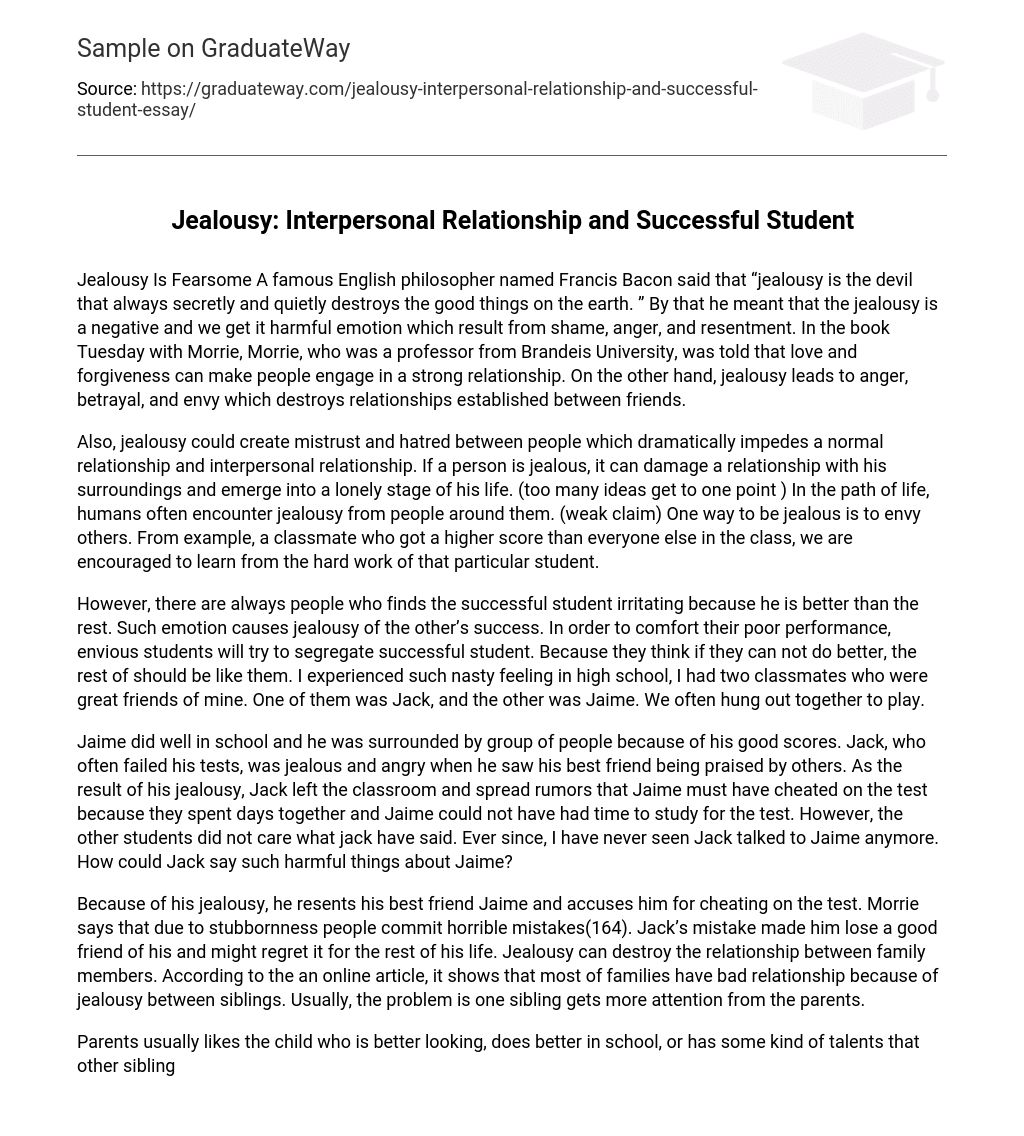Jealousy, as described by Francis Bacon, is a powerful emotion that can destroy the positive aspects of life. It is likened to a devil that silently and destructively targets all that is good on Earth. This negative feeling stems from shame, anger, and resentment. In “Tuesday with Morrie,” a book written by Morrie, a professor at Brandeis University, love and forgiveness are highlighted as crucial elements for building strong relationships. On the other hand, jealousy breeds anger, betrayal, and envy which ultimately lead to the breakdown of friendships.
Jealousy can significantly hinder normal relationships and interpersonal connections by creating mistrust and hatred between individuals. When a person experiences jealousy, it can detrimentally affect their relationships with those around them, leading to feelings of loneliness. Throughout their lives, humans frequently encounter jealousy from others. Envy towards others is one form of jealousy that individuals may experience. For instance, when a classmate achieves a higher score than everyone else in the class, we are inspired to learn from their hard work.
Nevertheless, there will always be individuals who find the accomplished student bothersome due to their superiority over others. This sentiment breeds envy and leads others to covet the success of the student. To alleviate their own dissatisfaction with their subpar performance, these envious students attempt to distance themselves from the successful student. They hold the belief that if they cannot excel, then everyone else should also fall short. I encountered this displeasing sensation firsthand during my time in high school when I had two intimate friends in my class, Jack and Jaime. We would frequently spend time together and engage in playful activities.
Jaime excelled academically, attracting a group of admirers due to his impressive performance. Conversely, Jack, who consistently struggled with his assessments, felt envious and furious witnessing the accolades Jaime received from others. His resentment caused him to storm out of the classroom and propagate false claims that Jaime likely resorted to cheating on the exam. Jack based this assumption on the extensive time they spent together, which supposedly left Jaime insufficient opportunities for studying. Yet, the other students remained indifferent towards Jack’s assertions. Consequently, Jack has refrained from interacting with Jaime ever since. It is perplexing how Jack could utter such detrimental statements about Jaime.
Jack holds resentment towards his best friend Jaime and accuses him of cheating on the test, which is a result of jealousy. According to Morrie, stubbornness can lead individuals to make terrible mistakes (164). As a consequence of Jack’s mistake, he may lose a valuable friend and potentially regret it indefinitely. Jealousy has the capability to destroy familial relationships. An online article discloses that many families encounter strained relationships due to sibling jealousy. Frequently, this problem arises when one sibling receives more attention from their parents.
Young children often struggle to handle and express their feelings towards their siblings due to their lack of emotional maturity. This is particularly evident when parents display favoritism towards more attractive, academically successful, or uniquely talented children. Consequently, jealousy can lead to sibling rivalries where communication deteriorates and destructive behavior arises as a way to seek parental attention. Regrettably, these actions frequently result in punishment from the parents. It is apparent from observations that jealousy primarily stems from a longing for attention and appreciation that children are not receiving.
Regardless of their relationship with siblings, children may experience feelings of insecurity and frustration when unable to fulfill their desires. It is crucial that we do not neglect our siblings, as this could result in them severing ties with us and potentially forgetting about us during times when we need them the most (96). Jealousy can play a comforting role and may even be present within a marriage, but it is essential to clarify its reasons. While these situations are prevalent in society, jealousy within a marriage has the potential to escalate into dangerous behavior by one partner.
Jealousy can harm a marriage in various ways. For example, a husband may feel upset when he sees his wife dancing with an old friend at a party. Similarly, a wife may become overwhelmed with jealousy when she witnesses her husband talking to his ex-girlfriend. Additionally, constantly comparing one’s spouse’s attractiveness to others can create tension in the marriage and make the other partner feel neglected or betrayed. This fear of losing their loved ones introduces jealousy into the relationship.
The loss of their partners results in arguments and fights, as feelings of betrayal cause distress. Marriage holds great significance in our lives and should not be easily abandoned. When problems arise in the relationship, it is crucial to address any doubts that emerge. The most effective approach is through open communication with our partners, resolving misunderstandings to rebuild trust. Jealousy within a marriage exemplifies its ability to breed mistrust between partners. All individuals undergo a range of emotions.
Jealousy is a damaging emotion that does not strengthen relationships but rather weakens long-standing ones. While some may argue that it can drive individuals to work harder and self-improve, it is inherent in human nature to vehemently reject failure and become jealous of what we lack or cannot achieve, leading to distorted thinking. Ultimately, these negative emotions result in misunderstandings, hatred, and envy, further harming relationships.





